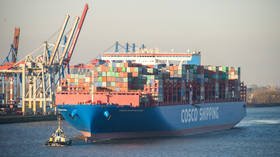Global trade may fall victim to Washington’s tariff hike on Chinese goods – Moody’s

Washington’s decision to increase import duties on $200 billion worth of Chinese imports may shake global trading environment and further slow growth, according to a Moody’s Investors Service assessment.
The additional 15 percent in levies exacerbate “the uncertainty in the global trading environment” as well as “negatively affects global sentiment and adds to risk aversion globally,” Michael Taylor, a Moody’s managing director and chief credit officer for Asia Pacific, said in an emailed comment as cited by media.
“The higher tariffs could also lead to the repricing of risk assets globally, tighter financing conditions and slower growth,” he said.
The analyst further added that the increased tariffs would have a “significant” effect on China in particular as the measure would hinder private investment decisions.
Later on Friday, the threat of global fallout from the trade spat between the two world’s biggest economies was acknowledged by the French foreign minister, who called the escalation of the row the biggest threat to world growth.
“It would mean that trade tariffs go up, fewer goods would circulate around the world… and jobs in France and in Europe would be destroyed,” Bruno Le Maire warned, as cited by media.
The warnings came as Beijing and Washington try to hammer out a trade deal to avert further escalation of their trade war after the US announced that import duties on Chinese goods will be raised from 10 to 25 percent. The hike comes into effect on May 10. China has already vowed to take “necessary countermeasures” in response.
While Moody’s still hopes that a trade deal will be reached, it says the risk of “a complete breakdown” in trade negotiations “has certainly increased.”
READ MORE: China vows to take 'necessary countermeasures' after US tariff hike, stalling talks
Hope for a last-minute agreement between the US and China mostly strengthened Asian stock markets on Friday. The benchmark Shanghai Composite index advanced 3.1 percent, while the Shenzhen Composite Index gained more than 3.8 percent. Another benchmark, Hong Kong’s Hang Seng Index, was up nearly one percent. However, Japan’s Nikkei closed with losses of 0.27 percent, while Taiwan TAIEX and Indonesia JAKIDX also slid.
For more stories on economy & finance visit RT's business section













